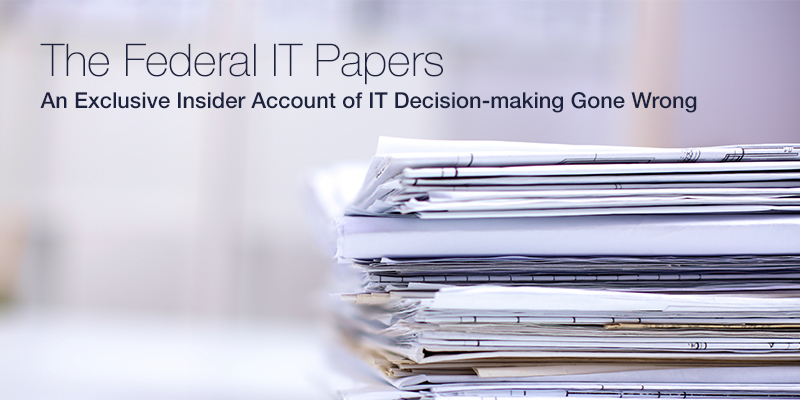
Do you want to really drive down the cost of wireless capability? Think about this. When do government employees draw down most of the data in their government-provided wireless device? For most agencies the biggest draw on their wireless devices occurs when they are at work. We are all catching up on email messages and checking our calendars during the day. When I get home my device connects to my home Wi-Fi, so it isn’t using data there. If we want to make this cheaper across the board we will deliver Wi-Fi capability inside our buildings. This will decrease the pull on the wireless service and actually increase the utility of the mobile devices (they will respond faster). If we get a big enough pool and they share on the Wi-Fi network at work and their home networks in the off hours, we might actually be able to reduce the requirement of data to the devices to as low as 1GB per month. That would be really cheap. Also, obviously the Wi-Fi can become a vulnerability point, so it must be secured.
Do you want to save even more money? How many fricking phone numbers does a government employee need to have? Almost everyone I know has both a mobile device and a desk phone. Some people have a couple mobile devices. Why in the hell do we still have desk phones? If you have a mobile device you should return your desk phone to the sender. For me, I try to not let anyone see the number to my desk phone. My reasoning is simple; I don’t want to be bothered with a bunch of different voicemail boxes. I have one voicemail box on my desk phone, another on my government-issued BlackBerry, and another on my personal iPhone. That is three in-boxes and an inordinate amount of complexity. There are too many opportunities for me to miss something important. So I work hard to ensure that my desk number is not published and nobody calls it. I put my BlackBerry number on my business cards but then I have everything that comes into it forward to my personal device. I check my email and calendar on my personal device using the agency-approved Good app. Thus my desk phone is a relic that sits unused on my desk. Like a paperweight it has lost its usefulness in a paperless office. My BlackBerry is chronically plugged in and never leaves my desk drawer, and I use my personal device for everything both work and personal. I can’t get the agency to stop either the BlackBerry or the desk phone or both.
If we feel like we need to have a consistent way to connect and call people, we would be better off adopting a Bring Your Own Device (BYOD) strategy and using Mobile Device Management (MDM) to create secure containers that can be remotely wiped on each device. Give the employee a $20 subsidy for data/telecommunications, and eliminate the personal phone cost from the agency in its entirety. This gives the flexibility to the employee to select and use the device that is best for him or her but still keeps agency data safe in a secure container.
Accessibility
Lastly, and I’m sure the Networst people thought they would slide by without anyone noticing, but their Section 508 compliance section is terrible. They are requiring a Voluntary Product Accessibility Template (VPAT). Basically what this is when a company stands up, raises its right hand and says, “On my honor this product is accessible to persons with disabilities.” Every company says that their products are accessible, but nobody actually checks, and it is only people who actually have disabilities who are disproportionately affected by the inaccessible products who stand up and say something.
Additionally, GSA hasn’t been a particularly strong player in accessibility lately. Try using the Concur travel system if you are visually impaired. So, I am not really betting on companies delivering accessible products, nor am I confident that GSA has any kind of testing process to identify what is and what is not technically Section 508 compliant.
What they should have done here instead is actually deliver some value for that 7 percent fee. How about developing a Section 508 Compliance Testing Center with coordination and insight from the Access Board? How about bringing in a couple of the DHS Trusted Testers (a really good program that teaches people how to test for the specific capabilities)?
Asking for a VPAT is like asking the guy from Office Space what his favorite Michael Bolton song is. There is no good answer.
Conclusion
In the end, it is all moot anyway. GSA is going to make some awards and it will be protested. The contract will probably be tied up in agency corrective action for a couple of years. In the end, what finally results from all this work will likely bear little resemblance to what was provided in the solicitation. My only point is that agencies need to really think about whether they are best served by using the NS2020/EIS contract or going out on their own. GSA doesn’t really seem to be providing any value for agencies, so why pay them a 7 percent fee?
1 http://www.gsa.gov/portal/content/104870
2 https://itdashboard.gov/drupal/data/datafeeds?format=csv
3 https://itdashboard.gov/drupal/sites/itdb/files/FY17_MegaITPortfolio-Presidents_Budget.xlsx
4 Page 4 http://www.gsa.gov/portal/getMediaData?mediaId=223175
5 https://www.whitehouse.gov/sites/default/files/omb/assets/omb/memoranda/fy2005/m05-22.pdf
6 https://www.whitehouse.gov/sites/default/files/omb/assets/egov_docs/transition-to-ipv6.pdf
7 https://fedv6-deployment.antd.nist.gov/cfo.html
8 https://www.whitehouse.gov/sites/default/files/omb/egov/digital-government/digital-government.html
In This Series:
